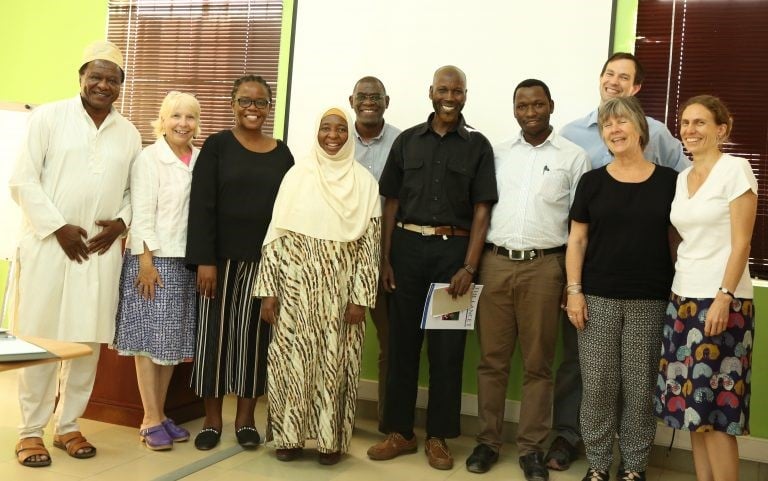From 2014 onwards, Soapbox worked with partners in Tanzania and Zanzibar to improve health service quality and contribute towards efforts to improve maternal health and reduce infection rates. In 2014, a water, sanitation and hygiene (WASH) needs assessment was carried out at all 37 facilities providing maternity services in Zanzibar in collaboration with the Pemba Public Health Laboratory (PHL-IdC), the Ministry of Health (MoH) and WaterAid Tanzania. The results highlighted gaps in key resources and knowledge around hand hygiene at the time of delivery.
TEACH CLEAN implementation and evaluation in Tanzania
Results of our needs assessments in a variety of countries, including Zanzibar, identified a lack of infection prevention training available for staff. They also commonly found bacterial contamination on high-risk sites such as door handles and maternity ward beds. Studies in LMICs have shown that gross contamination of environmental surfaces is a potential source of infection during outbreaks in neonatal units. Evidence from the UK demonstrates reduced infection following improved hospital cleaning.
TEACH CLEAN, Soapbox’s participatory training package for healthcare staff with cleaning responsibilities, was implemented in 3 maternity units in Dar Es Salaam in 2018-19 as part of the Joint Global Health Trials-funded CLEAN study.
Over the course of the 18-month research study, experienced trainers at Muhimbili University of Health and Allied Sciences (MUHAS) assessed the needs of the focus hospitals and then adapted the training package to fit the Tanzanian setting - ensuring consistency with national cleaning guidelines and local context. MUHAS then led a four-day Training The Trainers workshop where 18 supervisors (nurses and midwifes from participating maternity units) earned the title of ‘Cleaning Champions’ as they were trained in IPC and environmental hygiene theory, best cleaning practice, and participatory training methodology.
On completion of this training, the Champions were ready to train healthcare staff with cleaning responsibilities (including Cleaners, Medical Attendants and Nurses) at their own facilities. To date, 58 members of staff have been trained across twelve wards from the three participating hospitals with plans to rollout training to more staff in the coming months.
An independent evaluation of the training intervention, and measurement of the impact, was conducted by Ifakara Health Institute, in collaboration with London School of Hygiene and Tropical Medicine (LSHTM). There is evidence of some improvement in health worker knowledge, behaviours and surface cleanliness as measured by microbiological methods across each of the three maternity units. Following this development-phase study, researchers at LSHTM hope to secure further funding for a much larger trial to robustly test the impact of the implementation of the TEACH CLEAN package on HAIs in mothers and newborns. To inform the design of this future trial, there was a preliminary measurement of the prevalence of HAIs in each hospital. Results of the survey highlighted the challenge of diagnosing maternal and newborn infection in a consistent manner in the absence of routine microbiology. They also indicated an over-use of antibiotic prophylaxis which is vital to address in this era of growing antimicrobial resistance.
LSHTM’s Dr Susannah Woodd has also led an add-on study which is investigating self-reported infections among newborns and mothers using telephone surveillance. Research nurses recruited almost 900 women who they then followed up at 1- and 4-weeks post-birth.
Findings were presented and discussed with hospital staff and Ministry of Health representatives during the CLEAN Study dissemination event in Dar es Salaam on Thursday 11 July 2019 and researchers are currently preparing the qualitative and quantitative results for publication.

